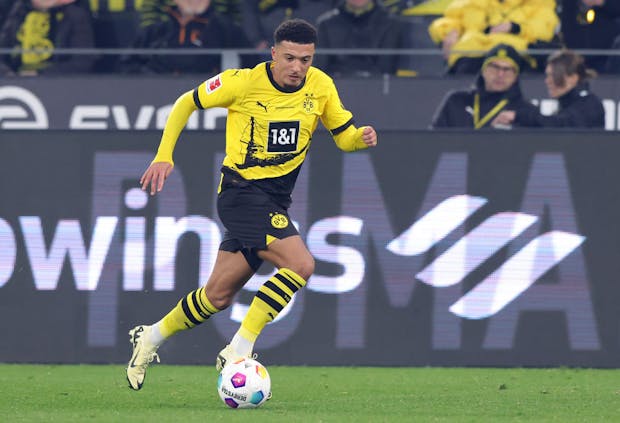
One media company will be permitted to land exclusive domestic broadcast rights to the Bundesliga after the Bundeskartellamt, the German cartel office, agreed to scrap the ‘no single-buyer’ rule in its preliminary assessment.
The German Football League (DFL) revealed the regulatory approval today (Tuesday) as it detailed the content, rights packages and auction process for the invitation to tender (ITT) for media rights for the 2025-26 to 2028-29 seasons.
The lifting of the no single-buyer rule, which prohibits live rights from being sold to a single broadcaster and which was introduced by the Bundeskartellamt in 2016, will be seen as a major boost to the DFL as it hopes to combat tough market conditions and retain the value of its current contracts worth €1.1bn ($1.2bn) per year.
The DFL will hope broadcasters will be incentivised to pay more for exclusivity.
Seven live rights packages will be put on the market when the DFL officially opens the auction in April (an exact date has not been revealed), five of which will be restricted to pay-TV bidders.
One of the tendered packages includes the rights to broadcast all individual Bundesliga matches on Friday and Saturday, which will therefore be shown by the same broadcaster. Previously, the matches on Friday and Sunday were bundled into one package, but the matches on Sunday can now be acquired in an individual package.
The seven packages on offer are:
Package A (pay-TV): Saturday 3.30pm ‘Konferenz’, comprising 161 matches.
Package B (pay-TV): all individual matches on Fridays and Saturday afternoons, and the Bundesliga versus 2. Bundesliga play-off (196 matches).
Package C (pay-TV): the top match on Saturday evening and the Supercup (34 matches).
Package D (pay-TV): individual matches on Sunday (79 matches).
Package E (free-to-air): the Bundesliga and 2. Bundesliga season-openers; the last Bundesliga Friday match before the winter break; the first Bundesliga Friday match after the winter break; all four play-offs; and the Supercup (9 matches).
Package F (pay-TV): all fixtures in 2. Bundesliga on Friday evenings at 6.30pm, Saturday afternoons at 1pm and Sundays at 1.30pm, as well as the 2. Bundesliga versus 3 Liga play-off (275 matches).
Package G (pay and/or free-to-air): Saturday evening 2. Bundesliga match at 8.30pm (33 matches).
The DFL also said it is building more free-to-air flexibility into the forthcoming cycle. While certain live packages are restricted to pay-TV bidders, there will be “more opportunities to broadcast a certain number of matches on a free-to-air basis – either on their own channels/platforms, or in cooperation with other free-to-air broadcasters/streaming services”.
There will be an additional eight highlights packages tendered, one of which will be limited to pay-TV bidders. That is for clips after the final whistle for both leagues.
A newly-introduced highlights package is focused on digital platforms and includes the broadcasting of short 90-second clips. In-game social media clips are also offered.
The rights package for the first free-to-air TV coverage on Saturday evening will be part of the ITT in two variants: firstly, for a broadcasting window from 6pm to 8.15pm and secondly for a broadcasting window from 7.15pm to 8.15pm. The variants are introduced as the DFL continues to weigh up the balance of affording more exclusivity to live pay-TV rights-holders and protecting the wide exposure generated on early evening highlights that been showcased for decades on ARD’s ‘Sportschau’ programme.
Two weeks ago, the DFL opened the registration phase for the ITT, which along with Germany also covers the rights in Austria, Switzerland, Liechtenstein, Luxembourg, South Tyrol and East Belgium.
The league said today that it plans to send all approved companies the tender documents starting in the middle of February, with the auction expected to start in mid-April.
Scheduling
Monday night fixtures were axed ahead of the current rights cycle due to protests from fans.
The DFL said the only adjustment to the match scheduling from 2025-26 onwards will be that 15 matches per season involving clubs competing in the Uefa Champions League will be played on Sundays at 7.30pm, compared with 10 matches annually at present. This is due to the impending expansion of Europe’s elite clubs competition, effective from 2024-25.
Production innovation
With all Bundesliga matches shown live, the DFL has a difficult challenge to generate more money from broadcasters without being able to offer more inventory.
In a bid to address that, it is set to innovate production and give media partners greater access to players.
In the new cycle, a total of 28 cameras will be used regularly at top matches, while broadcasters will have an “innovation budget at their disposal”, enabling them to transmit in Ultra High-Definition, for example. Additional live productions in 9:16 format optimised for smartphones are also envisaged, the league said today.
As per an agreement reached last month, clubs will cooperate more with the league’s broadcasters, enhancing coverage during the week and on matchdays. This will be include more interview opportunities, such as with players coming off the team bus and on the pitch immediately at full-time. There will also be greater use of live content on social media.
The bulk of the €1.1bn per season rights fee at present comes from subscription broadcasters DAZN and Sky Deutschland, which share the key live rights packages during the last auction. Commercial broadcasting group ProSiebenSat.1 holds free-to-air rights to nine Bundesliga matches per season, sports broadcaster Sport1 has non-exclusive digital rights to 33 matches per season and ARD shows free-to-air highlights.
Audio rights, both broadcast and digital, were awarded to ARD, and the digital-out-of-home package was awarded to Axel Springer.